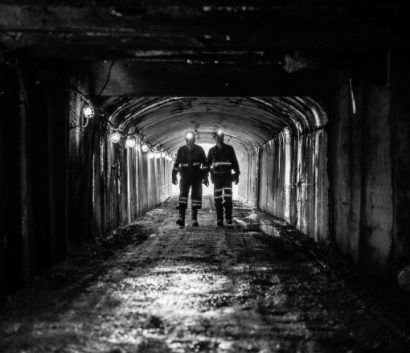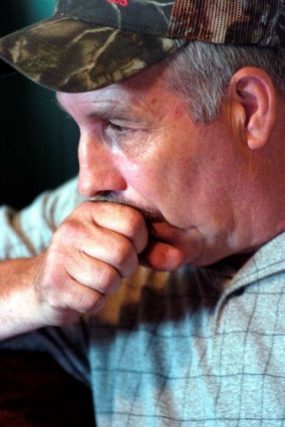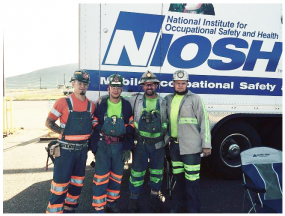National Miners Day
“The first priority and concern of all in the mining industry must be the health and safety of our most precious resource, the miner.”

Mining Health and Safety
National Miners Day, December 6, was established in 2009 to remember miners who died working in the mines and to honor the hard work and commitment of today’s miners.
As a result of a string of horrific mining tragedies early in the 20th century, the U.S. Bureau of Mines was created in 1910 to conduct research to enhance the safety and health of those who worked in mining. This became the foundation of the present NIOSH Mining Program, tasked with eliminating mining fatalities, injuries, and illnesses. The Program’s research portfolio includes:
- Preventing fires and explosions
- Monitoring and controlling dust and toxic substances
- Enhancing electrical and mechanical safety
- Training for emergency preparedness and response
- Improving illumination and reducing glare
- Examining ventilation and ground control strategies
- Preventing musculoskeletal disorders and slips, trips, and falls
- Evaluating mining and processing safety
- Addressing worker fatigue and inexperience
NIOSH’s research efforts cover all sectors of mining including coal, metal, industrial minerals, and stone, sand & gravel, and operations both above and below ground. While health and safety concerns vary from one mining sector to another, lung disease continues to be an important risk for coal miners.

Miner coughing.
Lung Disease in Coal Miners
Exposure to respirable dust in coal mines can cause several lung diseases. These include black lung, silicosis, chronic obstructive pulmonary disease (COPD), bronchitis, and emphysema. Recent studies have shown many cases of severe in black lung in the U.S., most notably in central Appalachia. These lung diseases can be prevented by controlling respirable coal mine dust exposures and by early disease detection through health screening and surveillance.
Health Screening and Surveillance for Coal Miners
Regular screening is critical to catch early stages of lung disease so that steps can be taken to prevent progression to severe disease. In the U.S., all coal miners are required to receive a free medical examination when they start working in the industry and within 3 years after their initial examination. The same free examination must continue to be offered every 5 years after initial screening for as long as they work in coal mining.
Through the NIOSH Coal Workers’ Health Surveillance Program, mine operators arrange for local NIOSH-approved healthcare facilities to provide medical examinations. These are provided at no cost to all coal miners. Additionally, NIOSH program technicians travel throughout coal mining regions across the nation to provide the following services, also at no cost to miners:

Miners in front of NIOSH mobile screening clinic.
- Miner work histories
- Respiratory health assessment questionnaires
- Spirometry (lung function) testing
- Chest x-rays
- Blood pressure screenings
Screening dates and locations for screenings offered by NIOSH mobile clinics are typically posted on the CWHSP web page each spring. However, this year the Coronavirus Disease 2019 (COVID-19) pandemic prevented the NIOSH mobile unit from offering health screenings. NIOSH is currently identifying screening dates and locations for late 2021.
Steps miners and operators can take to prevent illness and the spread of COVID-19 is provided on the CDC webpage COVID-19 and Mining.
Faces of Black Lung II Video
In early 2020, NIOSH released the Faces of Black Lung II video as a follow-up to the Faces of Black Lung I video. This new video provides viewers with insight from medical experts and testimonials of younger miners who have been diagnosed with severe Black Lung. The miners’ stories describe the full impact of this disease on coal miners today.
References
Federal Coal Mine Health and Safety Act of 1969
NIOSH Mining Topic: Respiratory Diseases
NIOSH Coal Workers’ Health Surveillance Program
NIOSH Coal Workers’ Health Surveillance Program – Faces of Black Lung
CDC Coronavirus Disease 2019 (COVID-19)
Contact Information
NIOSH Mining Program
mining@cdc.gov
Find us on Twitter: @NIOSHMining
NIOSH Coal Workers’ Health Surveillance Program
CWHSP@cdc.gov – 1-888-480-4042
Find us on Facebook at: @CWHSP or Twitter: @NIOSHBreathe
